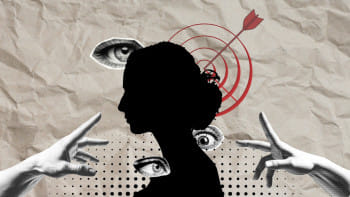Why this year’s Women’s Day matters

Every year on Women's Day, I proudly say, "Every day is women's day!" This year though, I laugh at myself for ever having thought so.
In Bangladesh, even Women's Day is not actually women's. No day is. It's particularly for this reason that this International Women's Day takes on much more urgency and significance.
Tomorrow (March 8), the world will celebrate the achievements of women throughout history. This day brings the opportunity to reflect on progress — however lacklustre — towards gender equality and raise awareness about the challenges women face.
With rising incidents of violence against women and girls, this day is no longer just a celebration. It is a stark reminder of the ongoing fight for safety, justice and equal rights in a society grappling with deeply ingrained gender-based discrimination.
Over the past year, reports on the state of women's rights in Bangladesh have painted a grim picture. "Grim" might even be an understatement.
Violence against women is pervasive. According to the Bangladesh Mahila Parishad, 2,362 women and girls were victims of violence in 2024 — 1,036 of them children. Of these, 486 were killed — at least one was killed every day — reflecting the brutality women face. In the first 11 months of 2024, 186 women and girls were raped (that is one every two days), 13 cases of gang rape were reported, and three were killed.
The Bangladesh National Women Lawyers Association reported 186 incidents of violence, including sexual violence and harassment, in September 2024 alone. These incidents are only a fraction of the actual number as many cases go unreported.
For many women in Bangladesh, the violence they face is essentially a societal issue. Cultural norms often encourage silence and stigmatise those who seek help. Speaking out about violence or seeking help can lead to victimisation or social ostracism. Consider the events of March 6, for instance. A man arrested for verbally harassing a woman was granted bail after the police station was besieged by men demanding his release and the plaintiff woman's arrest for mugging or defamation. One is bound to ask, "Then what is the point of even complaining in this country?"
This culture of silencing victims makes it harder to gauge the actual extent of the issue.
Another troubling aspect of gender-based violence in Bangladesh is the phenomenon of women against women behaviour, where women themselves perpetuate violence or discrimination against other women.
This can take various forms, from bullying and emotional abuse to complicit behaviour in enforcing patriarchal norms.
Many cannot forget incidents like a mob harassing a girl for wearing jeans at a train station—it was a woman who had started it. Or the girl berated on a bus by a conservative woman, blaming her for all the rapes in the country because of her attire.
Often, these actions stem from internalised misogyny, where women, conditioned by societal norms, perpetuate harmful practices like child marriage, dowry demands, or even blaming other women for their abuse. In such cases, women who have experienced oppression themselves may, unintentionally or otherwise, pass on the same suffering to the next generation.
The cycle of violence and subjugation becomes self-sustaining, and breaking this cycle requires challenging these gendered power structures that women themselves perpetuate.
The far-reaching social consequences of violence against women and girls are well known. They undermine economic development, education, and social harmony, and foster a culture of impunity and inequality. When women don't feel safe in their homes, workplaces, or public spaces, it limits their ability to contribute meaningfully to their communities, affecting not just their well-being but the progress of the nation.
Despite these dark realities, advocacy around gender-based violence in Bangladesh is rising. A growing movement to change societal attitudes towards violence against women is gaining traction, despite efforts to suppress it. However, there is no question that much remains to be done, particularly in law enforcement.
As the world celebrates International Women's Day, it serves us both as a reminder of the progress and a call to address the violence and discrimination we face.
As the number of women and girls affected by violence continues to rise, the need for government action, stronger legal protection, and cultural change has never been more imperative.
As we mark International Women's Day, we must acknowledge that true gender equality cannot be achieved until women and girls are free from violence in all its forms, so that they can walk the streets, enter their homes, and go to work with dignity, respect, and safety.

 For all latest news, follow The Daily Star's Google News channel.
For all latest news, follow The Daily Star's Google News channel. 











Comments